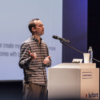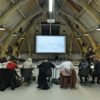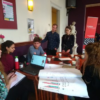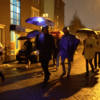[urban interfaces] Blogs

New chapter “From real-time city to asynchronicity: exploring the real-time smart city dashboard”
Fresh from the press, this interesting edited volume by colleagues Sybille Lammes, Chris Perkins, Alex Gekker, Sam Hind, Clancy Wilmott and Daniel Evans, called “Time for mapping: Cartographic temporalities”. I have a chapter in the book called “From real-time city to asynchronicity: exploring the real-time smart city dashboard”. In this essay, I pursue the idea of an…
Read more
Interview Medialab Katowice about municipal data and public values
Medialab Katowice published an e-mail interview with me, as part of the Data (for) Culture conference in Katowice at which I spoke in December 2017. Here is the link to the interview on the Medialab Katowice website >> Below the original correspondence (unedited version of the interview): Łukasz Mirocha (LM): Generally speaking, what is the role of data in the…
Read more
Perceiving the Invisible: Speculation as Interface at Sonic Acts Academy 2018 by Paul Schmidt
The small hand-held device Limenia picks up electromagnetic radiation from the surrounding and turns it into sound. In transposing this “electrosphere” into the spectrum of human perception, the device serves as an interface, allowing us to undertake speculations about this ordinarily imperceptible hyperobject that we create with our skyrocketing information and communication infrastructure and that…
Read more
Report workshop “Critical Making of Frictional Urban Interfaces”
On March 6 and 7 2018, I co-organized the workshop “Critical Making of Frictional Urban Interfaces”, as part of the course Urban Interfaces that I teach together with Nanna Verhoeff. The workshop was a collaboration between Utrecht University’s Media & Culture Studies department (research group [urban interfaces] + the research master program Media, Arts & Performance),…
Read more
Drifting the City #1: Wanderlust/Drift Club by Paul Schmidt
The drifters. A peculiar group of a dozen people in big raincoats. They follow a string of holiday lights, wrapped around the rod of a black umbrella and dancing through wind and weather like an electrified firefly. Their ritualistic appearance as non-speaking crowd, confidently and calmly marching through abandoned streets against the backdrop of the…
Read more
